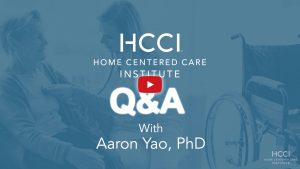HCCI Research Solutions for Growing Your HBPC Practice
About this Article:
A growing evidence base shows that home-based primary care (HBPC) improves quality of care and promotes aging in place while reducing overall healthcare costs. Being able to access and use this information to demonstrate value to payers and other stakeholders is critical for HBPC practices looking to sustain and grow their house call programs.
HCCInsights recently sat down for a video interview with Aaron Yao, PhD, HCCI Research Director, research scientist in geriatrics at the University of Virginia, and Cheeloo Scholar Professor at the Shandong University College of Medicine in Jinan City, China. Also participating in the conversation was Melissa Singleton, HCCI Chief Learning Officer, as the discussion focused on the research HCCI performs and the services it offers HBPC practices seeking to answer critical questions about their programs, competitors and the communities they serve.
HCCInsights: Can you describe some of the different types of research you conduct?
Dr. Yao: Some of it is very clinical. For example, we recently helped author a paper on pharmacist reviews of home care patient medications, which is related to clinical operations management. I am also currently working on a clinical study on the use of point-of-care ultrasound technology in home care practices.
HCCI also offers healthcare services research where we look at things like HBPC supply and demand, the workforce, and its utilization by older frail patients. In this role, we can help HBPC practices in many ways, including seeing how they compare with their competitors and evaluating key factors in their individual programs.
Melissa Singleton: Everything HCCI does in terms of educating or consulting with providers and practices is grounded, to the best of our ability, in evidence-based research. HCCI not only publishes Dr. Yao’s original research, but we also monitor published studies relevant to the field that support and reinforce the guidance we provide. In addition, our staff and network of partners are on the front lines across the country as co-authors and principal investigators for a wide range of research studies.
HCCInsights: What process do you follow when undertaking a research project?
Dr. Yao: It depends on the type of research project. With academic research, for example, it’s all about it being novel ─ is it something new or is there already an abundance of published studies on the subject? Because if the research isn’t novel, it is not likely to be published.
The next consideration is data. Research data can be collected either through primary or secondary sources. Data collected for the first time for purposes of a specific study is called “primary data” ─ while “secondary data” is existing data that has been collected by other researchers or organizations.
Researchers typically try to start with existing or secondary data because it saves time and money. At HCCI, we have a significant amount of in-house secondary data that we obtain from a variety of sources, including Medicare and population data from the Census Bureau, yearly American Community Surveys, and other literature. This is the kind of data that allows HCCI to conduct in-depth analyses on a regional basis on behalf of individual HBPC practices and on a national basis for larger clients.
Melissa Singleton: HCCI can analyze data from a practice to help it establish and achieve quality improvement goals. We can also work with practices to design and execute custom studies. Whether you have a small practice with limited research resources or a larger practice interested in a resource that specializes in home care medicine, HCCI can serve as an extension of your own team to analyze data and make recommendations for improving your practice’s efficiency and financial bottom line, and ultimately enhancing quality of care for your patients.
For more information on HCCI Research Services, click here.

